Best of #econtwitter - Week of November 29, 2020 (1/2)
Nov 30, 2020
Welcome readers old and new to this week’s edition of the Best of Econtwitter. Thanks to those sharing suggestions, over email or on Twitter @just_economics.
Paper summaries

Johannes Haushofer@jhaushofer
I'm happy these results are out, even though they're not what I expected and perhaps hoped for: we find very little impact of a (very good, a priori) psychotherapy program on economic and psychological well-being; but as previously, robust and decently sized impacts of cash.

NBER @nberpubs
Large randomized experiment in Kenya shows positive effects of cash transfers, but not of a psychotherapy program, on psychological and economic outcomes, from @jhaushofer, Robert Mudida, and @jeremypshapiro
https://t.co/Rhq3vymjFT https://t.co/Fz2DNsrOri
7:09 PM · Nov 23, 2020
121 Reposts · 602 Likes

Stefan Bauernschuster@SBauernschuster
We formed an Austrian-Bavarian combo to study the “Minimum Legal Drinking Age (MLDA) and the Social Gradient in Binge Drinking” in Austria (MLDA of 16 as in many European countries), with @AhammerAlex @HallaMartin & Hannah Lachenmaier. tinyurl.com/y2j7fep6 #econtwitter 1/6

8:41 AM · Nov 23, 2020
9 Reposts · 30 Likes
^"So much for the idea that lower MLDAs help people to ease into drinking" — see this figure

Cody Cook@codyfcook
First paper —> first tweet
"The Gender Pay Gap in the Gig Economy: Evidence from 1mil Uber Drivers” (with Diamond, Hall, List, @pauloyer) is forthcoming at ReStud. Uber pay doesn’t depend on gender, but we find that male Uber drivers make 7% more than female drivers [1/9]
1:40 AM · Nov 20, 2020
358 Reposts · 1.61K Likes

Benjamin Schoefer@Schoefer_B
New paper: why don't firms hire away the extra unemployed in recessions?
@SedlacekPe,@ayusufmercan & I argue: since MORE unemployed find jobs, the new jobs they'd fill are congested, accounting for 30-40% of US unemp fluct's.+App's to other macro puzzles.
eml.berkeley.edu/~schoefer/scho…
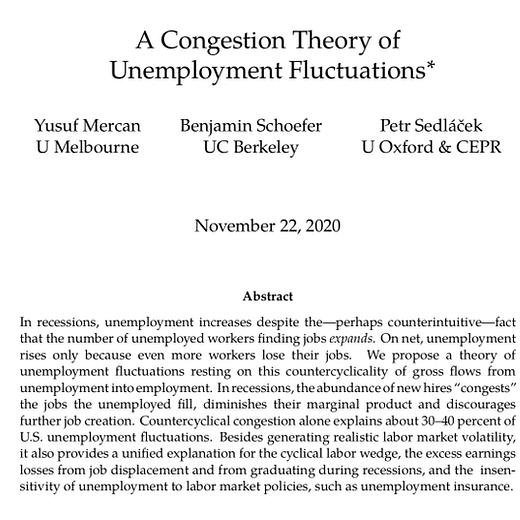
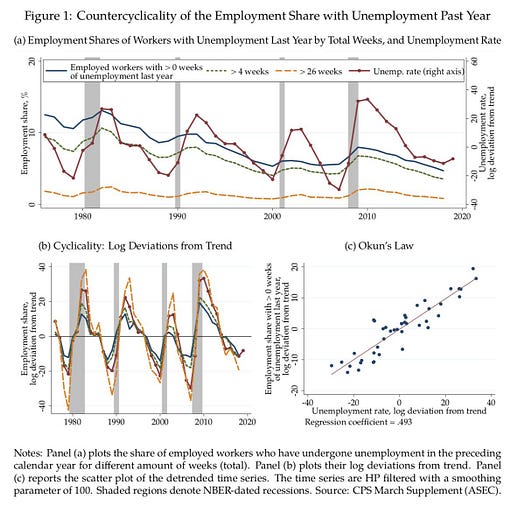
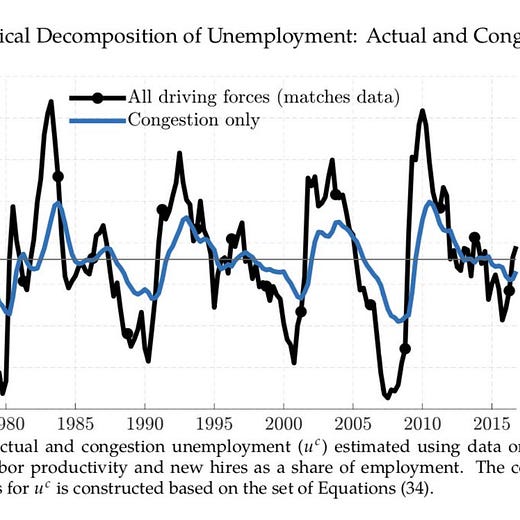
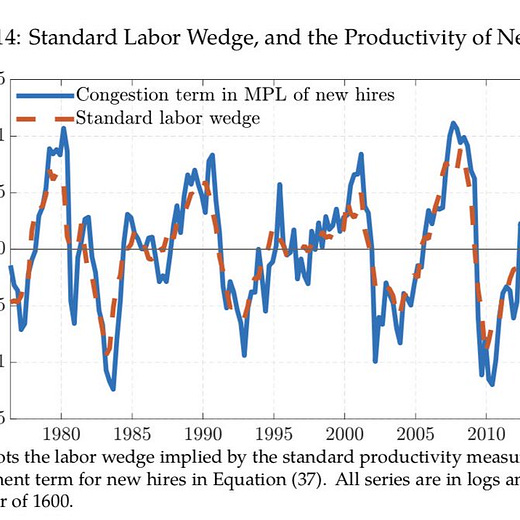
3:28 PM · Nov 24, 2020
31 Reposts · 122 Likes
^commentary: “Important paper alert: with one tweak to an otherwise standard DMP model, you can explain several facts that are seemingly puzzling / proved challenging through the lens of existing work.”

Michael Ewens@startupecon
If I had to pick one figure for the paper that tells the "startups are staying private longer", here it is:


Review of Financial Studies @RevOfFinStudies
Now available: RFS December issue 33(12), featuring an #editorschoice by Michael Ewens @startupecon @caltech and Joan Farre-Mensa @jfm82 @UICbusiness
https://t.co/16Tm1b1vYu https://t.co/0BZgKPJZPT
7:12 PM · Nov 23, 2020
8 Reposts · 40 Likes

Jonathan T. Rothwell@jtrothwell
After several years of research, I'm delighted to announce the publication of: "The Black innovators who elevated the United States: Reassessing the Golden Age of Invention" brook.gs/38VaU5g via @BrookingsInst, w @andreperryedu & Mike Andrews
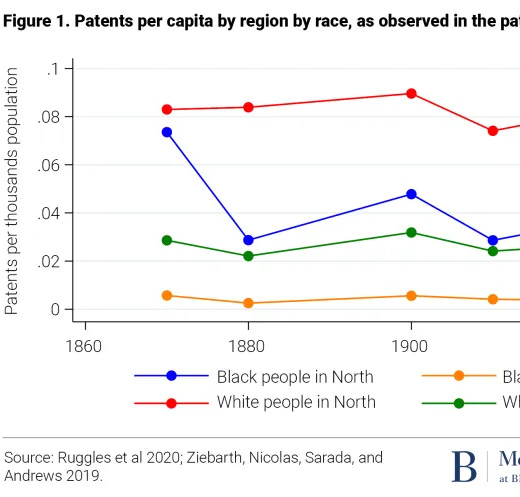
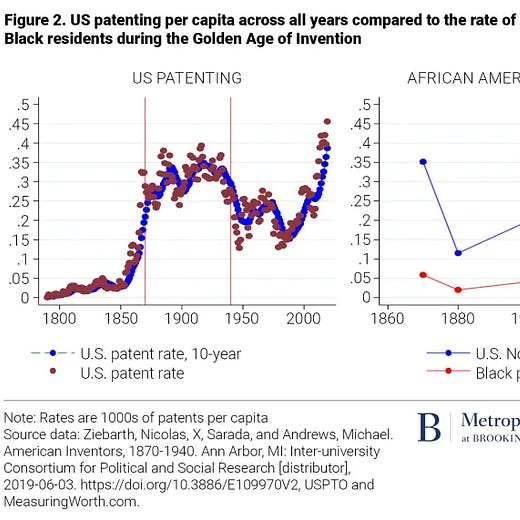
8:32 PM · Nov 23, 2020
17 Reposts · 30 Likes

Jordan Matsudaira@jdmatsudaira
When we average effects across cohorts, we find that an additional $1000 of Pell eligibility increases the probability of completion by 2-3% for dependent students but find no effects on earnings (tho earnings ests are noisy since they are based on years when DC is small). 4/
5:39 PM · Nov 23, 2020
1 Repost · 8 Likes

Karthik Muralidharan@karthik_econ
Govts around the world are trying school management reforms. In a new paper using a large-scale RCT in India (bit.ly/35WHq50) @singhabhi & I find no evidence of impact from several "best practices"
Yet, the program was scaled up to >600,000 schools (w/ no effect)! 1/
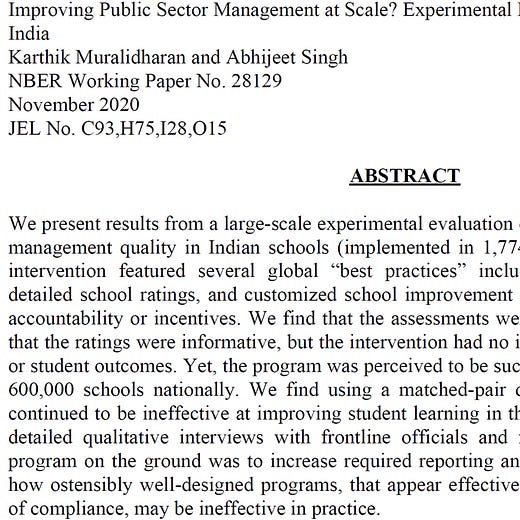

8:17 AM · Nov 24, 2020
109 Reposts · 355 Likes

Olle Hammar@ollehammar
Decomposing global earnings inequality within and between countries:
👉Falling global earnings inequality is due to decreasing between-country inequality, i.e. earnings convergence
👉At the same time, average within-country earnings inequality has increased [4/10]

11:54 PM · Nov 24, 2020
14 Reposts · 49 Likes

Riley Wilson@1rileywilson
We often see people staying in depressed labor markets, but it is unclear why. I test to see if exposure to information about strong labor market conditions in other markets induces people to move to those markets. The upshot? Yes, it does!
5:41 AM · Nov 25, 2020
2 Reposts · 16 Likes

Santiago Tobón@SantiagoTobon
In brief, I find that mistreating inmates does not have a deterrent effect, but rather increases recidivism.
I compare inmates assigned to new vs old prisons. For inmates assigned to newer prisons, I find that the probability of returning to prison within 1 year is 36% lower
11:58 PM · Nov 23, 2020
12 Reposts · 68 Likes

Fabian Eckert@fpeckert
🚨The City Paradox: Skilled Services and Remote Work
\w @AlthoffLukas @sharatganapati @Conor_A_Walsh
We show that remote work jobs are disproportionately in big cities.
As a result, low skill service workers bore the majority of the pandemic’s economic impact.
More 👇🏻
5:01 PM · Nov 25, 2020
21 Reposts · 83 Likes

Arpit Gupta@arpitrage
It seems like we have some generalized response issues with phone surveys; which is affecting contact tracing, polling, and the CPS itself.
Getting rid of spam calls may not entirely fix, but would help us regain our phone social capital.

Erin Wolcott @DrErinWolcott
📢New working paper with Robert Bernhardt & David Munro! Since 2010 and before the pandemic, the share of households refusing the CPS *tripled*. We show refusal rates correlate with manuf. decline and their rise has biased key labor market indicators. https://t.co/JOr9EI0CHq https://t.co/ZHVPkPBh1Z
5:15 PM · Nov 25, 2020
6 Likes

Jonathan Colmer@JonathanColmer
#Econtwitter @john_voorheis and I have a new working paper out! Using newly linked admin data containing more than 150 million parent-child links we document that reductions in prenatal particulate matter (PM) exposure have intergenerational effects!
tinyurl.com
The Grandkids Aren’t Alright: The Intergenerational Effects of Prenatal Pollution Exposure

3:50 PM · Nov 25, 2020
28 Reposts · 87 Likes

Aurélien Goutsmedt@AGoutsmedt
1/22 The 1970s Stagflation transformed the US economy, but also triggered major changes in macroeconomics. But how have macroeconomists explained stagflation since then? My new paper tries to answer this question by drawing a history of stagflation explanations from 1975 to 2013.

11:41 AM · Nov 27, 2020
34 Reposts · 106 Likes

Aurelie Ouss@AurelieOuss
I'm so excited that my paper is out! Main result: I find that when costs of incarceration are internalized by the entity choosing punishment (which is not typical in the US), incarceration is lower, without detectable effects on crime.

Journal of Public Economics @JPubEcon
Recently published paper in the @JPubEcon :
"Misaligned Incentives and the Scale of Incarceration in the United States"
Vol 191 (Nov 2020)
by Aurelie Ouss (@AurelieOuss )
https://t.co/le4A2I6WBE
3:06 PM · Nov 25, 2020
60 Reposts · 320 Likes
^this is the kind of (timeseries) diff-in-diff figure you dream about

Alexander Berger@albrgr
This is a really interesting paper that could change how I think about climate policy options: mitpressjournals.org/doi/pdf/10.116…
Would be curious to see replies if folks are aware of them.

Matto Mildenberger @mmildenberger
Exciting news! @MichaelAklin and my new provocation is out in @GepJournal. We make a simple but far-reaching claim. **Empirically, climate politics is NOT primarily about collective action or free-riding**. A quick 🧵on why we've all been prisoners of the wrong dilemma 1/ https://t.co/p6wjxVXVSB
7:45 PM · Nov 24, 2020
2 Reposts · 19 Likes

Ralph Lütticke@RalphLuet
PSA: New version of "Shocks, Frictions, and Inequality in US Business Cycles" with @christianbaye13 @bornecon that looks at the drivers of US business cycles and inequality through the lens of estimated HANK models - estimating variants w/wo cross-sectional data and shocks.

4:13 PM · Nov 27, 2020
10 Reposts · 70 Likes
Public goods

Christine Cai²@Christine_Cai27
🚨 Curious about recent advances on applied micro methods 🤓? I'm sharing a doc that I've put together and that lists a bunch of papers such advances. Suggestions are welcome! 🚨
👉 christinecai.github.io/PublicGoods/ap… 👈
#EconTwitter #PublicGoods #AppliedMicro #Econometrics

5:50 PM · Nov 23, 2020
407 Reposts · 1.7K Likes

Lee E. Ohanian@lee_ohanian
Great idea: support group for PhD students in economics - webinar on December 1.

PeacehD @DPeaceh
Join me in the presentation of PeacehD on Tuesday December 1st at 18h CET (in English).
Zoom link: https://t.co/dqLHhXHERD
PDF at: https://t.co/6kal0nctrR https://t.co/VUhTYGJyi0
6:15 PM · Nov 26, 2020
7 Likes

Imran Rasul@ImranRasul3
We recently started an initiative @JEEA_News asking authors of accepted papers to also send teaching slides for their work. These are all now posted in one place on the @EEANews website
Hope they are useful for those preparing to teach econ in 2021!
eeassoc.org/teaching-mater…

6:52 AM · Nov 27, 2020
81 Reposts · 379 Likes

scott cunningham@causalinf
Alright take two. NOW the google form for the #AEA5k 2021 race is working. Hopefully anyway. "Google, do as I say not as I do" didn't quite work, so I had to read the manual but I think it's working now.
forms.gle
Registration for 2021 #AEA5k!

4:25 PM · Nov 28, 2020
17 Reposts · 62 Likes

